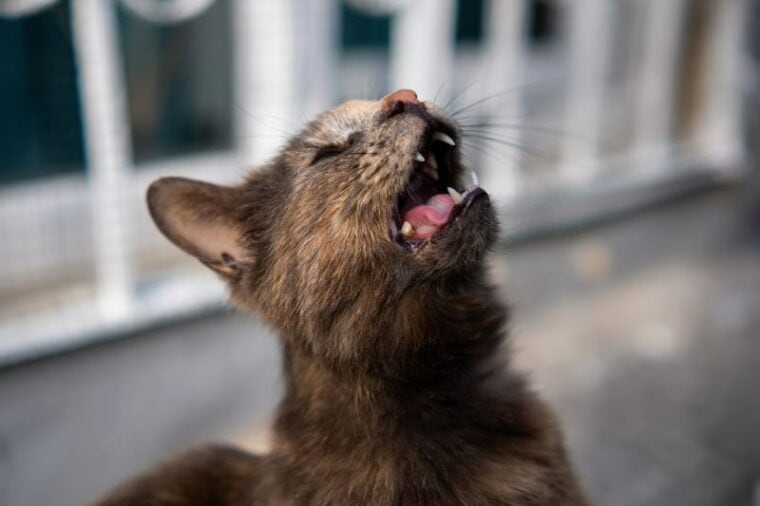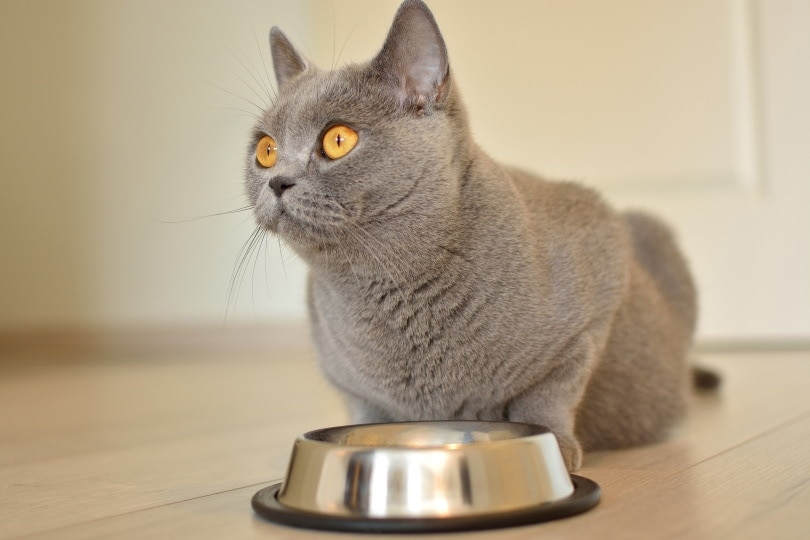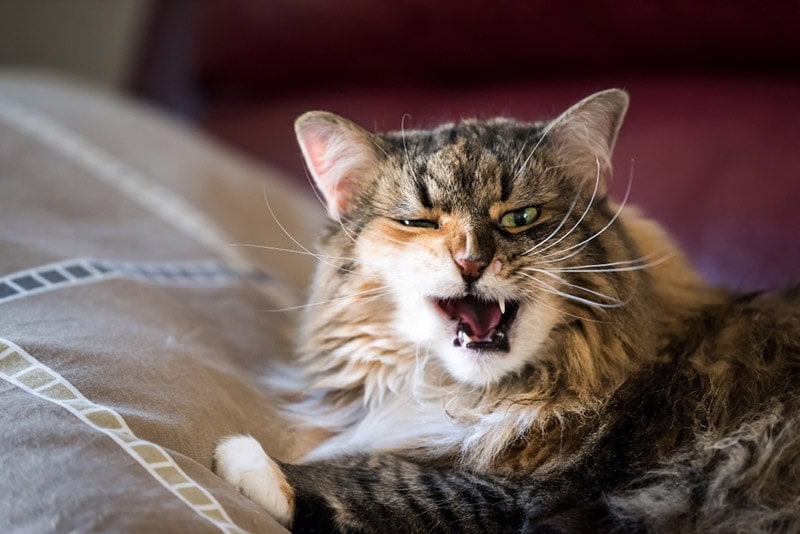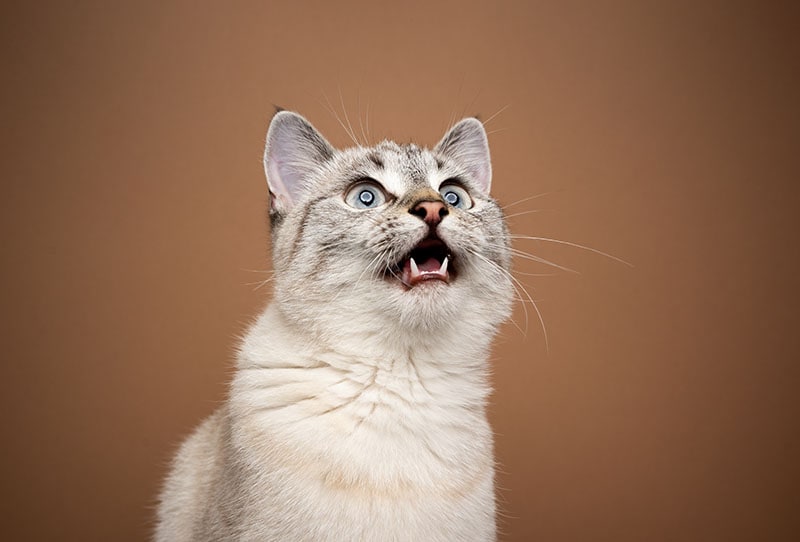
There is a misconception that cats are antisocial, but the truth is that cats can be very chatty! Cats often vocalize to communicate with their humans. The main issue is that we rarely know exactly what our felines are saying.
There are many reasons that a cat may cry, making it difficult to determine the reason for this behavior. In this article, we’ll go over some of the main reasons your cat may be crying, but remember that they may be vocalizing for more than just one reason.
The 10 Likely Reasons Your Cat Is Crying
1. Demanding Food
This should come as no surprise to cat owners, but our feline friends are pretty serious about their food. If your cat thinks you’re even a second late in bringing them their meal, he may hound you with cries and yowls until they hear the kibble clinking in their bowl.
You may notice that your cat cries whenever someone walks near their food bowl, or they may get louder as their mealtime rolls around. Either way, these are indications that your cat is demanding food, and they probably quiet down once they get it.
Bear in mind that if your cat is suddenly demanding more food than usual, this might be an indicator that they need to see their vet. Certain hormonal problems such as diabetes and hyperthyroidism present with an unusual ravenous appetite.

2. Asking for Attention
Cats are not as antisocial and aloof as some might believe. In fact, cats are very social and enjoy having contact with their favorite humans—just on their terms. If your cat is crying around you, it may be their way of saying it’s time for petting and love. You may also notice them pawing at you.
If meowing for attention is a recurring issue, that may be a sign that your cat feels ignored. Start scheduling regular playtime with your cat so that he receives more attention. If your cat receives adequate time with you, the crying for attention should stop.
3. Wanting to Be Let Out
Does your cat like to wander outside from time to time? If so, crying may be a sign that he wants to be let out. On the other hand, if you have an indoor cat that you lock out of your bedroom at night, he may cry outside the door because he wants to be let in.
Either way, your cat wants access to something he does not already have. If you are trying to cut the outdoors out of your cat’s life or keep your cat out of certain rooms, you will need to brace yourself for a few weeks (maybe even months) of crying.
4. Looking for a Mate
If you haven’t had your cat fixed, they might be yowling to advertise themselves as a mate. Both male and female cats will vocalize to find a mate. Your cat will continuously cry when searching for a mate, and the only way to end it is to have your cat sterilized.

5. Experiencing Cognitive Decline
The sad reality of aging is that there is a chance of cognitive decline. If your cat is growing elderly, he may be suffering from disorientation and will cry out as a result. Yowling is a common sign of feline dementia. Other notable signs include urinating or defecating outside of the litter box, changes in routine, and changes in sleeping patterns.
If you suspect your cat is experiencing cognitive decline, contact your vet. They can advise you on the best course of action for managing your cat’s condition.
6. Expressing Loneliness
If your cat cries excessively, they may express their loneliness the only way he knows how. Take inventory of how much time you can spend with your cat—if you can rarely entertain him, there is a significant chance that he is lonely.
While you are away from home, consider hiring a pet sitter. In addition, new toys, or interactive puzzles could all be great options for reducing their loneliness by entertaining them.
7. Vocalizing Due to Illness or Injury
One of the first things you should do when you notice your cat meowing excessively is contact your vet. There is a chance that your cat’s crying could be the result of an illness or injury.
Since cats are adept at disguising their discomfort, noticing other signs of sickness or pain can be tricky. Therefore, you shouldn’t rely too heavily on a lack of health signs to determine whether or not your cat is sick, as your cat actively seeks to mask any conditions he is suffering from. This is especially important if your cat is vocalizing when using their litter box. This can be a sign of an urinary blockage and early intervention can be life saving.

8. Communicating Stress or Fear
Distressed cats often become more vocal. If your cat is experiencing significant stress, such as adapting to a new home or family dynamic, he may cry out more often. Similarly, if your cat is frightened due to visitors in the home or a storm outside, he may cry due to fear. Typically, stressed or frightened cats eventually progress to hissing or growling if the stressor remains for too long. To alleviate your cat’s distress, try to pinpoint the cause of their stress or anxiety so you can remove it from their environment, if possible.
9. Expressing Annoyance
Cats are not afraid to tell us how they feel. If your cat is being put in an uncomfortable or unpleasant situation, he may yowl to tell you how much he disapproves. Sometimes, doing things our cats don’t like is inevitable: such as brushing their teeth or trips to the vet. But there are times when we can reduce our cat’s annoyance by changing our behavior, such as not petting them when they’ve grown agitated with it.
10. Just Chatting
Pay attention to the sound of your cat’s vocalization. Is he crying? Or is he just mowing as usual? If he’s meowing, then the chances are that he is just saying “hello.”
Many cats meow when their favorite family members return home, and some breeds are predisposed to meowing more often, such as the Siamese or the Bengal. If you’ve ruled out behavioral issues, environmental stressors, and medical complications, your cat is just happy to see you and wants to chat for a bit.

How to Decipher the Reason for Your Cat’s Crying
It can be difficult to tell why your cat is crying. The sound of a cat’s cry may give you clues as to what your cat is feeling, but it will rarely give you much more than that. Pay attention to their body language to determine the cause of your cat’s crying.
If your cat is happy or relaxed, they may look sleepy. Their head won’t move much, and their ears, body, and tail will be relaxed. Their eyes may look as though they are about to doze off. If your cat is meowing like this, chances are they are just saying “hi.”
On the other hand, a distressed cat may flick their ears around quickly, desperate to capture all sounds. Their eyes will be intent and watchful, with dilated pupils. The tail may be rigid and upright, curled around their body, or swishing aggressively. If you notice these signs, then your cat is likely crying out for a purpose.
If you believe your cat has a purpose for their yowling, you can try to pinpoint it by noting when and where they yowl the most. Placing context to their behavior may help you narrow down the root of their crying.
Conclusion
It’s not always easy to determine why our cats are crying. The best way to narrow it down is to take your cat to the vet to rule out medical issues, then observe the times and places he cries most. Eventually, you should be able to pinpoint why your cat is crying and, if necessary, find a solution to minimize their yowling.
Featured Image Credit: FrimuFilms, Shutterstock







